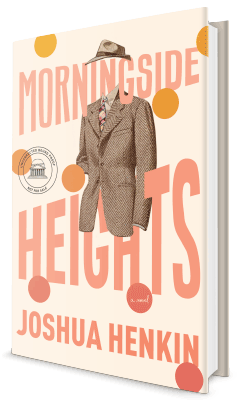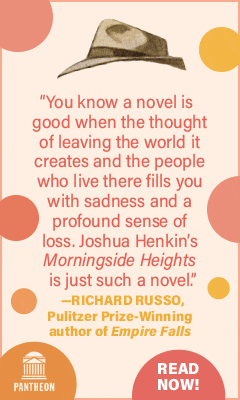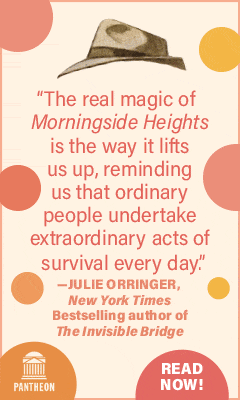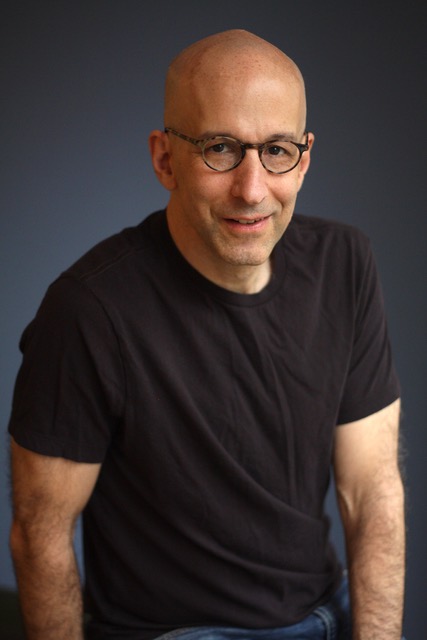Morningside Heights
by Joshua Henkin
In Morningside Heights, a complex and character-driven novel, Joshua Henkin (The World Without You; Matrimony) explores what is lost and gained in loving another person: a parent, a spouse, a child, a sibling, a friend.
When Pru moves to New York City in 1976, she thinks she knows what she wants. But while studying Shakespeare, she falls head over heels for her grad school professor--a cliché even to her, as an active participant in the affair--and ultimately abandons her academic pursuits in favor of marriage to the brilliant Spence Robin. The two have a daughter, Sarah, and occasionally host Spence's son, Arlo, for visits. Each week, Spence visits his sister, Enid, brain damaged from a drunk driving accident as a teen, in a nearby nursing home. Sarah goes to college. Arlo meets Enid. Spence teaches. Pru gets a job in fundraising. Life ticks on.
And then, decades later, Spence begins acting oddly. Forgetting words, moments, names. Mixing up details, missing classes. He and Pru attend a costume party in black tie clothing when Spence misunderstands "festive" attire to be "formal" attire. It's almost funny, except that there is an underlying concern to the scene that implies there is something more sinister than a need for better reading glasses. Readers will not be surprised when these symptoms ultimately lead to a diagnosis of early-onset Alzheimer's; Pru, on the other hand, is caught off guard, once again finding that the life she thought she had planned out is gone.
This diagnosis drives Morningside Heights forward to its sadly inevitable conclusion. Alzheimer's, after all, remains incurable. Drawing in part on his own experience watching his father battle the disease, Henkin explores with great tenderness the many, many challenges of losing a loved one to Alzheimer's, the ways in which it both saddens and frustrates, moves too slowly and also entirely too fast. "Tell me all the things I'm going to forget," Spence says to Pru shortly after his diagnosis. "Will I forget to love you?... Don't let me forget to love you."
It is impossible to read such an exchange and not be moved, not to see the gentle ways Henkin picks and probes at the unique form of loss that Alzheimer's puts a family through. Despite this, though, Morningside Heights is not, ultimately, a sad novel. Henkin imbues it with a sense of hope, a kind of appreciation for the mundane moments that make up a life, the relationships that define not just who a person is, but what they can become.
Though Pru and Spence's relationship forms the backbone of Morningside Heights, Henkin expertly moves between the internal and external thoughts of each of the many characters in its pages. In so doing, the novel offers nuanced perspectives of the relationships among them. Pru sees herself as a professor's wife, then as caregiver for an ailing husband; a mother who heaps praise upon her daughter, and a stepmother who sometimes stumbles in finding patience for a troubled stepson. Arlo yearns for love and stability from his mother, his father, Pru, from anyone in his family, and, failing to find it, settles for attention instead. Sarah antagonizes her half-brother only to wish for his company when he's gone.
The true depth of Morningside Heights lies in Henkin's ability to portray each of these relationships at a particular moment in time, but also in the ways that they--like all relationships--are fluid. In speaking of his relationship with Spence, Pru tells Arlo, "There's regret on both sides. But that doesn't have to be the end of the story." And it is not the end of the story, metaphorically or literally; this exchange happens midway through the book, despite it being near the end of Spence's life.
Henkin uses these connections and the moments they are made of to move Morningside Heights backward and forward in time, from Pru's arrival in New York in the 1970s to Spence's funeral in the early 2000s. This is not, however, a novel of flashbacks or vignettes; the shift from past to present and back again is so fluid that the effect is kaleidoscopic, each moment bleeding into the next in ways that shed new light on what we know and understand about this family and its many dimensions.
Morningside Heights is powerful in a quiet, unsuspecting way. Nothing particularly big happens. There are no twists, no magical cures to Spence's illness, no perfect resolution between characters who have been unkind to one another over the years. But in Henkin's masterful hands, this story of everyday events becomes bigger than the sum of its parts, a novel that explores what it means--and what it takes--to love another person, and to be loved in return. --Kerry McHugh








